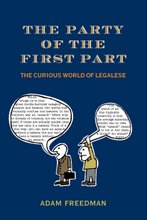Next week, the Supreme Court will ponder whether they should rule on the constitutionality of Washington, D.C.'s strict gun control ordinance. If they take the case, their interpretation of the controversial Second Amendment may depend on the meaning of all the commas put in there by our punctuation-happy Founding Fathers.
As the DC Legal Times reports, the grammar war is under way.
Saturday, November 17, 2007
Subscribe to:
Post Comments (Atom)


4 comments:
just a note, "their" should be "there"
Just wanted to make sure that you were paying attention.
Thanks, anonymous!
Good job getting this published as a tawdry puff piece in the Times.
Semantics of a legal argument are of interest but a fundamental right is more at issue here. You do wide disservice to the readers of the publication by deluding them about the issue at hand by contorting into the abstractions of Latin grammar instead of talking about past relevance and fundamentals of the issues at hand. Many nuances are well documented and historical relevance is writ wide over many cases.
Spending your article proving your issue of little justification as you note at the end of the article but still feeling the need to impose a view that you find pleasing on the relevance of the grammar is trite. Believing that you can use this to divine what the founding fathers thought better than a simple historical review of their actual positions and views on the matter debases the argument and shows a complete lack of respect for the issue at hand.
One of many relevant books you may want to read is "Freedmen, the fourteenth amendment, and the right to bear arms, 1866-1876" by Halbrook (0-275-96331-4) which would disabuse you of trivializing this debate in the manner you have. Shame on you if you have have not read even an elementary book on the issue. However given your focus on the trivial element and seeming ignorance of the multitude of issues that this encompasses shows neither tact nor common sense to learn a subject before commenting upon it. Living with your intellectual dishonesty must be a sad display of cognitive dissonance.
I have long pondered the commas in the second ammendment but didn't know that others were thinking the same thoughts. In view of the excellent literary capabilities of the writers of the constitution, it seems obvious that they would not have included both thoughts WITHIN THE SAME SENTENCE if they did not intend the right to bear arms to apply to state militias. Commas notwithstanding, the meaning seems clear to me.
Post a Comment